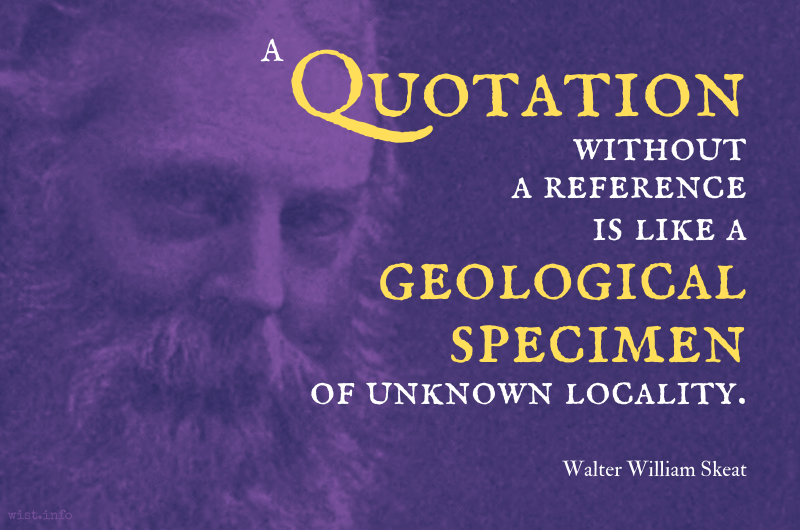Of all authors, I despise none more than the compilers, who go off in all directions looking for bits and pieces of other writers’ works, which they then stick into their own, like pieces of turf into a lawn; they’re in no way superior to those printer’s typesetters, who arrange letters which, combined together, make a book, to which they contributed only the manual labour. I would like the original texts to be respected; I feel it’s a kind of profanation, to extract the pieces which make them up from the sanctuary where they belong, and expose them to a contempt they do not deserve. When a man has nothing new to say, why does he not keep silent?
[De tous les auteurs, il n’y en a point que je méprise plus que les compilateurs, qui vont, de tous côtés, chercher des lambeaux des ouvrages des autres, qu’ils plaquent dans les leurs, comme des pièces de gazon dans un parterre: ils ne sont point au-dessus de ces ouvriers d’imprimerie qui rangent des caractères, qui, combinés ensemble, font un livre où ils n’ont fourni que la main. Je voudrois qu’on respectât les livres originaux; et il me semble que c’est une espèce de profanation de tirer les pièces qui les composent du sanctuaire où elles sont, pour les exposer à un mépris qu’elles ne méritent point. Quand un homme n’a rien à dire de nouveau, que ne se tait-il?]Charles-Lewis de Secondat, Baron de Montesquieu (1689-1755) French political philosopher
Persian Letters [Lettres Persanes], Letter 66, Rica to *** (1721) [tr. Mauldon (2008)]
(Source)
It is unclear what Montesquieu / his character would have thought of quotation collections.
(Source (French)). Alternate translations:
Of all Authors, there is none I despise more than the Compilers, who forage far and wide for Scraps of other Men's Works, which they piece into their own, like so many Dabs of Green Turf in a Flower-garden: they are not a whit superior to those that work in a Printing-house, who distribute the Types, which being put together make a Book, towards which they furnish'd nothing but Manual Labour. I am for having Original Authors reverenc'd: and, in my Judgment, 'tis a sort of Prophanation to drag, as it were out of their Sanctuary, Pieces of their Works, and expose them to a Contempt which they deserve not. If a Man has nothing new to say, why don't he hold his Tongue?
[tr. Ozell (1736 ed.), # 64]
Of all kind of authors, there are none I despise more than compilers, who search every where for shreds of other men's works, which they join to their own, like so many pieces of green turf in a garden: they are not at all superior to compositors in a printing house, who range the types, wh:ch, collected together, make a book, towards which they contribute nothing but the labours of the hand. I would have original writers respected, and it seems to me, a kind of profanation to take those pieces from the sanftuary in which they reside, and to expose them to a contempt they do not deserve. When a man hath nothing new to say, why does not he hold his tongue?
[tr. Floyd (1762)]
Of all the authors, there are none whom I despise more than compilers. They crowd from all quarters to pick up the shreds of other men’s works; these they fit into their own, as one would patch the turf of a lawn: they are not one whit superior to the compositor, whose type-setting may be called book-making if manual labor is all. I would have original books respected; and it seems to me a species of profanation, to take from them the matter of which they are composed, as if from a sanctuary, and expose it to an undeserved contempt. When a man has nothing new to say, why can’t he be quiet?
[tr. Davidson (1891)]
There is no class of authors I despise more than I do compilers, who come from every side to search for the fragments of other men's works, which they wedge into their own, just as you would introduce patches of turf into the border of a flower-plot. They are not superior to printers who arrange characters in such a way as to produce a book, but whose manual labor has been all that has entered into its composition. I would have original books respected. It is a kind of profanation to tear from them the parts of which they are composed, as if from a sanctuary, and thereby expose them to a contempt they do not deserve.
[tr. Betts (1897)]
Of all authors, I most despise the compilers, who search everywhere in the works of others for fragments which they then fit into their own, much as you would piece turf into a lawn. They are no better authors than the printers who select and combine letters and thus, contributing only their manual labor, make a book. I would have original books respected, and it seems to me that there is something profane in tearing constituent pieces from their sanctuary and exposing them to a scorn they do not deserve. When a man has nothing to say, why is he not silent?
[tr. Healy (1964)]
Of all these authors, the ones I despise the most are the compilers, the ones who rummage through the works of others and tear off strips to patch into their own books, like bits of turf in a lawn. They are no better than the compositors who work for the printers, putting letters together so as to form a book; they have contributed nothing but the use of their hands. I think original books ought to be more respected, for I think it is a kind of profanation to take fragments out of their sanctuary and expose them to a contempt that they do not merit. When a man has nothing new to say, why does he not keep quiet?
[tr. MacKenzie (2014)]
Quotations about:
context
Note not all quotations have been tagged, so Search may find additional quotes on this topic.
People feel shameful to be poor and underprivileged in a well-run country. You should feel shameful if you are rich and aristocratic in a decadent and corrupt country.
[邦有道、貧且賤焉、恥也、邦無道、富且貴焉、恥也。]
Confucius (c. 551- c. 479 BC) Chinese philosopher, sage, politician [孔夫子 (Kǒng Fūzǐ, K'ung Fu-tzu, K'ung Fu Tse), 孔子 (Kǒngzǐ, Chungni), 孔丘 (Kǒng Qiū, K'ung Ch'iu)]
The Analects [論語, 论语, Lúnyǔ], Book 8, verse 13, sec. 3 (8.13.3) (6th C. BC – AD 3rd C.) [tr. Li (2020)]
(Source)
Brooks (below) says that this analect was added into Book 8 at the time of Book 14 being produced.
(Source (Chinese)). Alternate translations:
When a country is well-governed, poverty and a mean condition are things to be ashamed of. When a country is ill-governed, riches and honour are things to be ashamed of.
[tr. Legge (1861)]
Under a good government it will be a disgrace to him if he remain in poverty and low estate; under a bad one it would be equally disgraceful to him to hold riches and honours.
[tr. Jennings (1895)]
When there is justice and order in the government of his own country, he should be ashamed to be poor and without honour; but when there is no justice in the government of his own country he should be ashamed to be rich and honoured.
[tr. Ku Hung-Ming (1898)]
When law and order prevail in his State, he is ashamed to be needy and of no account. When law and order fail, he is ashamed to be in affluence and honour.
[tr. Soothill (1910)]
When a state is functioning, poverty and meanness are shameful; when a state is in chaos (ill governed) riches and honours are shameful. [Let us say: under a corrupt government.]
[tr. Pound (1933)]
When the Way prevails in your own land, count it a disgrace to be needy and obscure; when the Way does not prevail in your land, then count it a disgrace to be rich and honoured.
[tr. Waley (1938)]
If a state is following The Right Way, it is a disgrace to be in poverty and a low estate therein; if not, it is a disgrace to be rich and honored therein.
[tr. Ware (1950)]
It is a shameful matter to be poor and humble when the Way prevails in the state. Equally, it is a shameful matter to be rich and noble when the Way falls into disuse in the state.
[tr. Lau (1979)]
When the Way prevails in your own state, to be made poor and obscure by it is a disgrace; but when teh Way does not prevail in your own state, to be made rich and honourable by it is a disgrace.
[tr. Dawson (1993)]
In a country where the Way prevails, it is shameful to remain poor and obscure; in a country which has lost the Way, it is shameful to become rich and honored.
[tr. Leys (1997)]
When the state possesses the Way and you are poor and lowly, it is a shame; when the state loses the Way and you are rich and noble, it is also a shame.
[tr. Huang (1997)]
If the country is on the right way, it is the shame to be poor and low; If the country is not on the right way, it is the shame to be rich and honor.
[tr. Cai/Yu (1998), #201]
It is a disgrace to remain poor and without rank when the way prevails in the state; it is a disgrace to be wealthy and of noble rank when it does not.
[tr. Ames/Rosemont (1998)]
When the state has the Way, to be poor and humble in it is shameful; when the state has not the Way, to be wealthy and honored in it is shameful.
[tr. Brooks/Brooks (1998)]
When the Way rules in your country, there's shame in poverty and obscurity; when the Way's lost in your country, there's shame in wealth and renown.
[tr. Hinton (1998)]
In a state that has the Way, to be poor and of low status is a cause for shame; in a state that is without the Way, to be wealthy and honored is equally a cause for shame.
[tr. Slingerland (2003)]
When the state follows the Way, being poor and lowly is a cause for shame. When the state is without the Way, being rich and eminent is a cause for shame.
[tr. Watson (2007)]
When the moral way prevails in a state, being poor and lowly is a cause for shame. When the moral way does not prevail in the world, having wealth and position is a cause for shame.
[tr. Chin (2014)]
Drama is very important in life: You have to come on with a bang. You never want to go out with a whimper. Everything can have drama if it’s done right. Even a pancake.
History, we can confidently assert, is useful in the sense that art and music, poetry and flowers, religion and philosophy are useful. Without it — as with these — life would be poorer and meaner; without it we should be denied some of those intellectual and moral experiences which give meaning and richness to life. Surely it is no accident that the study of history has been the solace of many of the noblest minds of every generation.
Henry Steele Commager (1902-1998) American historian, writer, activist
The Nature and Study of History, ch. 5 (1965)
(Source)
I protest, for about the hundredth time, against the slipshod method of quoting a mere author’s name, without any indication of the work of that author in which the alleged quotation may be found. Let us have accurate quotations and exact references, wherever such are to be found. […] A quotation without a reference is like a geological specimen of unknown locality.
Walter William Skeat (1835-1912) British philologist and cleric
Notes and Queries, 6th Series, vol. 9 (1884-06-21)
(Source)
There is no such thing as conversation. It is an illusion. There are intersecting monologues, that is all. We speak; we spread round us with sounds, with words, an emanation from ourselves. Sometimes they overlap the circles that others are spreading round themselves. Then they are affected by these other circles, to be sure, but not because of any real communication that has taken place — merely as a scarf of blue chiffon lying on a woman’s dressing table will change color if she casts down on it a scarf of red chiffon.
Rebecca West (1892-1983) British author, journalist, literary critic, travel writer [pseud. for Cicily Isabel Fairfield]
“There Is No Conversation,” The Saturday Evening Post (1928-12-08)
(Source)
In the initial magazine appearance, the third sentence read, "There are interesting monologues." When reprinted in The Harsh Voice: Four Short Novels (1935), and subsequently, interesting was replaced with intersecting.
More discussion about this quotation: There Is No Such Thing as Conversation. It Is an Illusion. There Are Intersecting Monologues, That Is All – Quote Investigator®.
No object is so ugly that, under certain conditions of light and shade, or proximity to other things, it will not look beautiful; no object is so beautiful that, under certain conditions, it will not look ugly.
Oscar Wilde (1854-1900) Irish poet, wit, dramatist
Lecture to Art Students, Royal Academy, London (30 Jun 1883)
(Source)
A problem never exists in isolation; it is surrounded by other problems in space and time. The more of the context of a problem that a scientist can comprehend, the greater are his chances of finding a truly adequate solution.
You can “just listen” to the Brahms violin concerto and enjoy it keenly. But if you read about Brahms’ life, you appreciate it more. And, if you’ve listened to recordings of it, you will appreciate it ten times as much.
Jascha Heifetz (1901-1987) Lithuanian-American violinist
(Unsourced)
Quoted on his official web page.
The secret thoughts of a man run over all things holy, prophane, clean, obscene, grave, and light, without shame, or blame.
Written down like this, it doesn’t seem a very good song, but coming through pale fawn fluff at about half-past eleven on a very sunny morning, it seemed to Pooh to be one of the best songs he had ever sung. So he went on singing it.
A. A. Milne (1882-1956) English poet and playwright [Alan Alexander Milne]
House at Pooh Corner, ch. 4 “Tiggers Don’t Climb Trees” (1928)
(Source)














